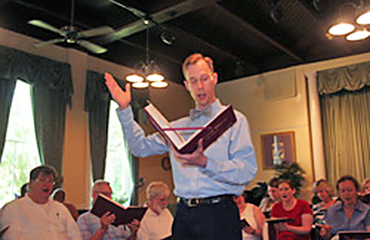
Lander assistant professor of music Robert Kelley was a featured speaker at a Piccolo Spoleto event covered by The New York Times.
Kelley's introduction to Sacred Harp singing kicked off an all-day event included as part of the companion festival to Spoleto Festival USA. While Spoleto Festival USA showcases artists and performers of national and international renown, Piccolo Spoleto features performances by local and regional artists.
The bible of Sacred Harp singers is "The Sacred Harp," a hymn book first published in 1844. Singers sit in a "hollow square," Kelley said, led by rotating song leaders, "singing for each other and for God."
The voice parts are represented by shape notes, which simplify musical notation. There are no instruments, only the "sacred harp" of the human voice.
Once popular in the North as well as the South, Sacred Harp singing might have vanished if it had not been kept alive in western North Carolina, Georgia, Alabama and Mississippi.
Kelley attributes the renewed interest in the tradition to the documentary film "Awake My Soul," to the popularity of folk music in the 1960s, and to the efforts of Hugh McGraw, the driving force behind the 1991 edition of "The Sacred Harp," which includes not only the old standards, but new songs, too.
Kelley was introduced to Sacred Harp singing four years ago, by a student who took him to an event at Furman University. He now attends a singing somewhere "just about every weekend," he said.
He includes elements of what he's learned in the world music class he teaches at Lander, and he's considering teaching a class specifically on Sacred Harp singing that would be offered as a continuing education course.
Kelley was pleased by the turnout for the event in Charleston, by the enthusiasm of participants, and by the acoustical qualities of the venue.
"It turned out to be a great singing," he said. "It exceeded my expectations all the way around."